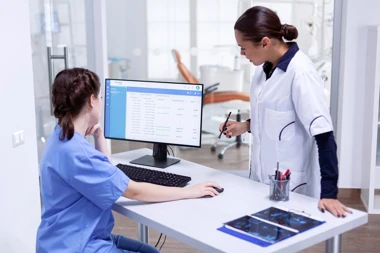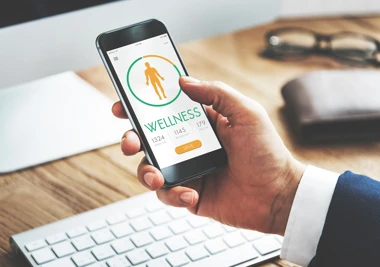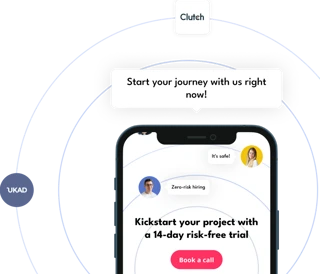In today's digital age, healthcare providers are embracing technology to improve patient care, streamline administrative tasks, and enhance overall operational efficiency. Healthcare software has emerged as a game-changer, offering a wide range of solutions to meet the diverse needs of medical practices. From medical billing software to patient management systems and mental health software, these technological advancements are reshaping the way healthcare is delivered. In this article, we will explore the variety and utilization of healthcare software and how it is transforming the industry for the better.
Brief History of Healthcare Software
The history of Healthcare software is a fascinating journey that has evolved over several decades, driven by advances in technology, the needs of medical personnel and patients, and regulatory changes. We listed the key milestones to provide a better understanding of this industry:
- 1960s-1970s
The earliest healthcare software systems were primarily focused on managing patient records and administrative tasks. These systems helped automate appointment scheduling, billing, and basic patient data management.
- 1980s
The 1980s saw the development of medical billing software that allowed healthcare providers to streamline the billing and claims process, reducing paperwork and increasing efficiency.
- 1990s
The 1990s marked the beginning of EHR systems. They aimed to digitize patient records, making them more accessible and reducing the need for paper records. However, adoption was slow due to high costs and interoperability challenges.
- 2000s
In the early 2000s, the US government introduced initiatives and incentives to encourage EHR adoption, including the Health Information Technology for Economic and Clinical Health (HITECH) Act in 2009. It led to a significant increase in EHR adoption rates.
Telemedicine and remote monitoring solutions gained prominence, allowing patients to receive healthcare services remotely, often through video consultations and wearable devices that track vital signs.
- 2010s
The proliferation of smartphones led to the development of mobile health apps, known as mHealth. These applications enable users to track their health, receive medication reminders, and access health information on their mobile devices.
Efforts have been made to improve interoperability between different healthcare systems and EHRs, allowing for the seamless exchange of patient data among healthcare providers while maintaining data security and privacy.
Healthcare organizations have increasingly adopted big data analytics to gain insights from large datasets. It has enabled better disease prediction, personalized medicine, and improved healthcare management.
- 2020s
The COVID-19 pandemic accelerated the adoption of telehealth and remote monitoring solutions. Healthcare software played a crucial role in providing care and monitoring patients during lockdowns and social distancing measures.
- Future
The future of healthcare software is likely to be heavily influenced by AI and machine learning. These technologies have the potential to revolutionize diagnostics, drug discovery, treatment planning, and disease prevention.
Throughout its history, Healthcare software has evolved from simple administrative tools to sophisticated systems that impact patient care, diagnosis, and treatment. Now, it is an integral part of modern medical routines, improving efficiency, patient outcomes, and the overall quality of healthcare delivery. The future promises even more exciting developments as technology continues to advance in this sector, thus don't waste your time and ask UKAD for a technical consultation!
Meeting the Demands of Modern Healthcare
The realm of healthcare software solutions is vast, catering to the ever-evolving needs of healthcare providers. One such essential tool is medical billing software, which automates the complex and time-consuming process of medical billing and coding. This software ensures accurate billing, reduces errors, and improves revenue cycles, allowing healthcare professionals to focus on patient care rather than administrative tasks.
Medical billing software helps streamline the billing process by generating electronic claims, automating coding, and handling insurance verifications. It also facilitates real-time eligibility checks, reducing the risk of claim denials and improving revenue collection. With built-in compliance features, these software solutions ensure adherence to regulatory requirements, reducing the chances of audit penalties. Moreover, by integrating with Electronic Health Records (EHR) systems, medical billing software creates a seamless flow of information, improving efficiency and reducing paperwork.
A great example of how technology is transforming healthcare is our recent Computer Vision project. By implementing advanced algorithms, we helped streamline data analysis and decision-making, demonstrating the real-world impact of modern healthcare software.

Enhancing Patient Management with Advanced Systems
Efficient patient management is crucial for delivering quality healthcare services. Patient management software has revolutionized this aspect by centralizing patient data, streamlining workflows, and improving communication between healthcare providers. Electronic Medical Records (EMR) systems are at the forefront of patient management software, enabling healthcare professionals to access and update patient information securely and conveniently. These systems facilitate seamless coordination among healthcare teams, resulting in enhanced patient outcomes and increased efficiency.
EMR systems store comprehensive patient information, including medical history, medications, lab results, and imaging reports. They provide a holistic view of the patient's health, allowing healthcare providers to make informed decisions and provide personalized care. These systems also support e-prescribing, reducing medication errors and enhancing patient safety. With secure messaging and collaboration features, healthcare teams can communicate and share information in real-time, promoting efficient care coordination.
Scheduling Software: Optimizing Workflow and Patient Experience
Efficient scheduling is essential for healthcare practices to operate smoothly. Traditional manual scheduling methods often lead to errors, longer waiting times, and decreased patient satisfaction. However, scheduling software has transformed this process by automating appointment bookings, optimizing physician schedules, and sending reminders to patients. These software solutions not only improve efficiency but also enhance the patient experience by reducing wait times and ensuring better utilization of healthcare resources.
Scheduling software offers features such as online appointment booking portals, automated appointment reminders via SMS or email, and waitlist management. Patients can easily schedule appointments at their convenience, reducing the need for lengthy phone calls and improving access to care. The software also optimizes scheduling by considering factors like physician availability, appointment types, and duration. This ensures that the right resources are allocated efficiently, minimizing wait times and maximizing productivity. Moreover, scheduling software integrates with other healthcare systems, such as EMR and billing software, creating a seamless workflow and minimizing data entry errors.
Transforming Communication and Engagement with Healthcare CRM
Healthcare Customer Relationship Management (CRM) software has emerged as a valuable tool for building and maintaining relationships with patients. By integrating data from various sources, healthcare CRM enables personalized communication, appointment reminders, and targeted health campaigns. It allows healthcare providers to engage with patients on a more personal level, improving patient satisfaction and loyalty.
Healthcare CRM software helps healthcare providers manage patient relationships by centralizing patient data, including contact information, medical history, and preferences. This data can be leveraged to personalize communication and engage patients in their healthcare journey. With automated appointment reminders, patients are less likely to miss appointments, leading to improved attendance rates and better healthcare outcomes. Additionally, healthcare CRM enables targeted health campaigns and educational materials, allowing providers to proactively address specific patient needs and promote preventive care.

Addressing the Mental Health Crisis with Dedicated Software
In recent years, mental health awareness has gained significant traction, highlighting the need for specialized tools to support mental healthcare providers. Mental health software has filled this gap, providing solutions that facilitate assessment, treatment planning, and remote therapy sessions. These platforms offer secure communication channels, electronic documentation, and outcome tracking, empowering mental health professionals to deliver effective care to their patients.
Mental health software supports the unique requirements of mental healthcare providers by offering features such as electronic assessments, treatment planning modules, and progress tracking tools. These platforms enable secure communication between therapists and clients, facilitating remote therapy sessions and reducing barriers to access. Electronic documentation features ensure that patient records are accurately maintained, streamlining the treatment process and improving continuity of care. Additionally, outcome tracking and reporting functionalities help therapists assess treatment effectiveness and adjust interventions as needed, leading to better patient outcomes.
Achieving Goals with Fitness Software
As soon as Healthcare refers not only to healing but also to preventing illnesses and improving quality of life, there emerged two kinds of closely related software: fitness and wellness applications. Thus, we have to take a look at them to stay on board.
Fitness software has become an integral part of modern fitness routines, helping individuals of all fitness levels and backgrounds stay motivated and make progress toward their health and wellness goals. Whether users are looking to lose weight, build muscle, improve cardiovascular health, or simply lead a healthier lifestyle, fitness software provides valuable tools and resources to support their journey.
It offers a wide range of tools and features to help users plan, track, and manage their physical activity, nutrition, and overall well-being. Fitness software has gained popularity due to its ability to provide personalized guidance, accountability, and data-driven insights into one's fitness journey. To reach these goals, common set of features includes:
- Workout Planning
These tools allow users to create or follow exercise routines tailored to their fitness levels, goals, and preferences. These plans may encompass various types of workouts, such as strength training, cardio, yoga, or flexibility exercises.
- Progress Tracking
Users can track their fitness progress by recording workout performance metrics, such as the number of reps, sets, or weight lifted. Progress tracking helps users see improvements over time and adjust their routines accordingly.
- Exercise Demonstrations
Many fitness apps include video demonstrations and step-by-step instructions for exercises. It helps users perform exercises with proper form to maximize effectiveness and minimize the risk of injury.
- Goal Setting
Fitness software enables users to set specific fitness goals, such as weight loss, muscle gain, or improved endurance. Users can monitor their progress toward these goals and adjust their plans accordingly.
- Community and Social Features
Many fitness apps offer community features, such as forums, social sharing, and challenges. These features provide motivation, support, and a sense of belonging to a fitness community.
- Integration with Wearables
Integration with popular fitness wearables and devices ensures that users can seamlessly sync their data, making it easier to track their physical activity and health metrics.

Keeping Lifestyle Healthy With Wellness Software
In essence, wellness software serves as a digital companion that promotes healthy living and helps users make informed decisions about their well-being, whether they want to manage stress, improve their diet, get in shape, or achieve better mental balance.
Wellness applications provide information and tips on various aspects of health, such as nutrition, fitness, sleep, and stress management. It helps users make healthier lifestyle choices, either set and track wellness goals, like losing weight, reducing stress, or improving sleep quality. As well, such applications send reminders and notifications to encourage users to stay consistent with their wellness routines.

The Best Sellers of Healthcare Software
There are lots of Healthcare and Wellness-related applications, but some of them are real gems with millions of users and years of improvements. We hope, this list can be both useful and inspirational and may improve every aspect of your life.
-
MyFitnessPal: This app helps users track their diet and exercise to achieve fitness goals, making it a valuable tool for maintaining overall health.
-
Calm: Calm is a meditation and relaxation app that offers guided meditation sessions, sleep stories, and stress reduction techniques to improve mental well-being.
-
GoodRx: GoodRx provides users with information on prescription drug prices, discounts, and coupons, helping them save money on medications.
-
Fitbit: Fitbit is a popular fitness tracker app that monitors physical activity, sleep patterns, heart rate, and more to promote a healthier lifestyle.
-
Doctor on Demand: This telemedicine app allows users to schedule virtual appointments with healthcare providers for a wide range of medical issues.
-
1mg: 1mg is a healthcare app that offers information on medicines, and their substitutes, and allows users to order medications online.
-
Headspace: Similar to Calm, Headspace offers meditation and mindfulness exercises to reduce stress, improve focus, and enhance mental health.
-
Zocdoc: Zocdoc helps users find and book appointments with doctors and healthcare providers in their area, simplifying the process of accessing medical care.
-
WebMD: WebMD provides comprehensive health information, symptom checker, and access to healthcare professionals to answer health-related questions.
-
Medisafe: Medisafe is a medication management app that helps users organize and track their medications, set reminders, and share information with caregivers or healthcare providers.
Conclusion
The adoption of healthcare software has ushered in a new era of efficiency, productivity, and improved patient care. From medical billing software to healthcare CRM and mental health software, these technological advancements have transformed various aspects of healthcare delivery. By automating administrative tasks, optimizing scheduling, streamlining patient management, and enhancing communication, healthcare software solutions have become indispensable for healthcare providers. As the industry continues to evolve, embracing these technological innovations will be crucial to meet the growing demands of modern healthcare and provide the best possible care for patients worldwide.
Contacts
-
Book a call Appointment - USA Appointment - USA -
Book a call Appointment - EU Book a call
Appointment - EU -
Whatsapp Talk to CEO Whatsapp
Talk to CEO -
Write to us hi@ukad-group.com Write to us
hi@ukad-group.com


